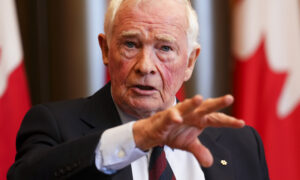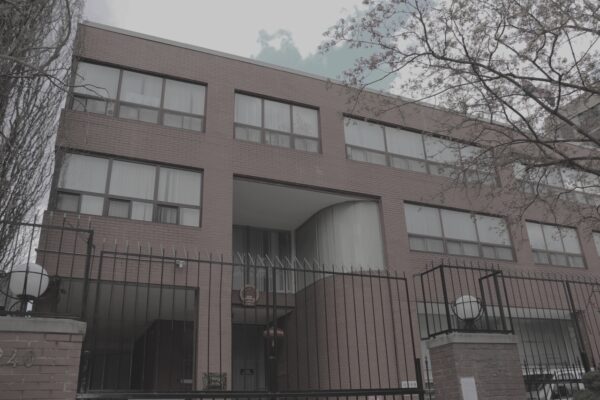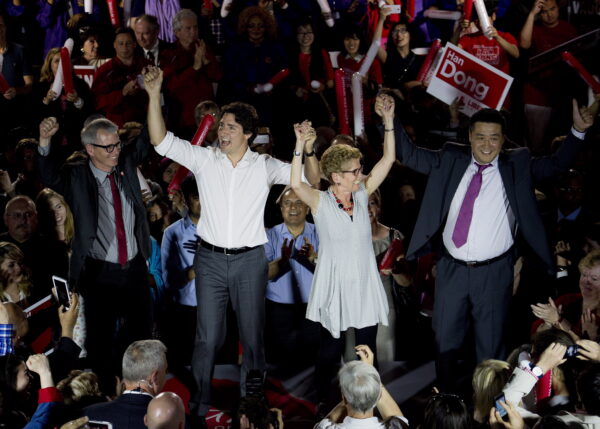What Johnston’s Report Says on MP Han Dong, Michael Chan, and Key Interference Allegations
Special rapporteur David Johnston’s first report comments on some of the Chinese interference allegations that have been reported in media based on intelligence leaks. This includes allegations against MP Han Dong, former Ontario Liberal cabinet minister Michael Chan, and the Chinese consulate’s interference in past federal elections. Here’s what the report says on these key allegations. 11 Candidates Being Funded by Consulate In a November 2022 article, the Global News revealed that Canadian intelligence officials had provided briefings and memos to Prime Minister Justin Trudeau and several cabinet members in January of that year. These briefings highlighted concerns about a foreign interference scheme orchestrated by the Chinese Communist Party (CCP), which involved the funding of a covert network consisting of at least 11 federal candidates who participated in the 2019 election. Johnston acknowledged that China had employed “proxy agents” and attempted to influence various Liberal and Conservative candidates in subtle ways. However, he disputed the allegations regarding the network of 11 federal candidates who allegedly received CCP funding. According to Johnston, there was no evidence to suggest that these 11 candidates were collaborating as a cohesive “network” or that they fully comprehended the intentions of the proxies involved. “Some of the candidates are well-integrated with Chinese Canadian community organizations. There is nothing inherently suspicious about this, as it is common for political candidates to rely on community support,” he wrote. “My conclusion is that there was no evidence presented to any Minister or the Prime Minister that any of the 11 candidates or any group of candidates were working together as part of a network. No recommendation about a network of candidates was made as no network was known to exist. No recommendation was ignored,” Johnston wrote. He also criticized the politicization of the issue, saying in his report that “all parties” engaged in posturing and disregarded facts in favour of slogans, many of which he said turned out to be inaccurate. During a press conference on May 23, when asked if the Liberal Party was also involved in this alleged posturing, Johnston didn’t answer the question, stating that many of the accusations lacked a “full panoply of information.” Chinese Funding Leaked information from the Canadian Security Intelligence Service (CSIS), as reported by Global News, indicated that the Chinese consulate in Toronto funneled approximately $250,000 in funding to the 11 candidates involved in the 2019 election. The funds were allegedly channeled through an Ontario MPP and a staff member of a federal election candidate, whose identities were not disclosed. A subsequent report from Global News, citing additional intelligence sources, identified Vincent Ke, a former member of the Ontario Progressive Conservatives, as the MPP in question. Johnston’s report questioned the validity of the allegations, describing them as “most inflammatory.” “There is uncertainty about whether there was money, if it actually went to staff or the provincial MPP, and there is no intelligence suggesting any federal candidates received these funds,” he wrote in the report. The Chinese Consulate in Toronto is seen on April 25, 2023. (Andrew Chen/The Epoch Times) Johnston also defended Prime Minister Justin Trudeau’s previous claims that he had never been briefed by the intelligence about “any federal candidates receiving money from China.” “The Prime Minister pointed out that he is not briefed on matters that are not supported by reliable intelligence. No recommendations were made to any Minister or the Prime Minister about this allegation, and therefore no recommendations were ignored,” he wrote in the report. Ke, who resigned from the PC Caucus to sit as an Independent following the Global News report, was not mentioned by name in Johnston’s report. Ke is suing Global News for defamation. He has not responded to inquiries from The Epoch Times. Han Dong MP Han Dong was caught in the centre of the Chinese interference allegations when Global News named him as one of the 11 federal candidates who received funding from CCP agents in the 2019 election, citing national security sources. He departed the Liberal Caucus to sit as an Independent MP for Ontario’s Don Valley North riding, shortly after the media outlet reported about his conversations with the Chinese consul general in Toronto, allegedly advising Beijing to hold off on the release of Canadians Michael Kovrig and Michael Spavor, who were arbitrarily detained in China. Johnston concluded that this allegation about Dong’s advice to Beijing about the two Canadians was “false,” though he acknowledged that the MP “continued to maintain close relationships with PRC [People’s Republic of China] consular officials at least through the 2021 [federal election].” Dong has denied the allegations and is suing Globa

Special rapporteur David Johnston’s first report comments on some of the Chinese interference allegations that have been reported in media based on intelligence leaks. This includes allegations against MP Han Dong, former Ontario Liberal cabinet minister Michael Chan, and the Chinese consulate’s interference in past federal elections.
Here’s what the report says on these key allegations.
11 Candidates Being Funded by Consulate
In a November 2022 article, the Global News revealed that Canadian intelligence officials had provided briefings and memos to Prime Minister Justin Trudeau and several cabinet members in January of that year. These briefings highlighted concerns about a foreign interference scheme orchestrated by the Chinese Communist Party (CCP), which involved the funding of a covert network consisting of at least 11 federal candidates who participated in the 2019 election.
Johnston acknowledged that China had employed “proxy agents” and attempted to influence various Liberal and Conservative candidates in subtle ways. However, he disputed the allegations regarding the network of 11 federal candidates who allegedly received CCP funding.
According to Johnston, there was no evidence to suggest that these 11 candidates were collaborating as a cohesive “network” or that they fully comprehended the intentions of the proxies involved. “Some of the candidates are well-integrated with Chinese Canadian community organizations. There is nothing inherently suspicious about this, as it is common for political candidates to rely on community support,” he wrote.
“My conclusion is that there was no evidence presented to any Minister or the Prime Minister that any of the 11 candidates or any group of candidates were working together as part of a network. No recommendation about a network of candidates was made as no network was known to exist. No recommendation was ignored,” Johnston wrote.
He also criticized the politicization of the issue, saying in his report that “all parties” engaged in posturing and disregarded facts in favour of slogans, many of which he said turned out to be inaccurate.
During a press conference on May 23, when asked if the Liberal Party was also involved in this alleged posturing, Johnston didn’t answer the question, stating that many of the accusations lacked a “full panoply of information.”
Chinese Funding
Leaked information from the Canadian Security Intelligence Service (CSIS), as reported by Global News, indicated that the Chinese consulate in Toronto funneled approximately $250,000 in funding to the 11 candidates involved in the 2019 election. The funds were allegedly channeled through an Ontario MPP and a staff member of a federal election candidate, whose identities were not disclosed.
A subsequent report from Global News, citing additional intelligence sources, identified Vincent Ke, a former member of the Ontario Progressive Conservatives, as the MPP in question.
Johnston’s report questioned the validity of the allegations, describing them as “most inflammatory.”
“There is uncertainty about whether there was money, if it actually went to staff or the provincial MPP, and there is no intelligence suggesting any federal candidates received these funds,” he wrote in the report.

Johnston also defended Prime Minister Justin Trudeau’s previous claims that he had never been briefed by the intelligence about “any federal candidates receiving money from China.”
“The Prime Minister pointed out that he is not briefed on matters that are not supported by reliable intelligence. No recommendations were made to any Minister or the Prime Minister about this allegation, and therefore no recommendations were ignored,” he wrote in the report.
Ke, who resigned from the PC Caucus to sit as an Independent following the Global News report, was not mentioned by name in Johnston’s report. Ke is suing Global News for defamation. He has not responded to inquiries from The Epoch Times.
Han Dong
MP Han Dong was caught in the centre of the Chinese interference allegations when Global News named him as one of the 11 federal candidates who received funding from CCP agents in the 2019 election, citing national security sources. He departed the Liberal Caucus to sit as an Independent MP for Ontario’s Don Valley North riding, shortly after the media outlet reported about his conversations with the Chinese consul general in Toronto, allegedly advising Beijing to hold off on the release of Canadians Michael Kovrig and Michael Spavor, who were arbitrarily detained in China.
Johnston concluded that this allegation about Dong’s advice to Beijing about the two Canadians was “false,” though he acknowledged that the MP “continued to maintain close relationships with PRC [People’s Republic of China] consular officials at least through the 2021 [federal election].”
Dong has denied the allegations and is suing Global News for libel. He issued a statement on May 23, expressing gratitude for Johnston’s support of his stance.
“I feel vindicated by Mr. Johnston’s report,” Dong wrote. “With respect to the allegation that I advised the Chinese consulate to extend the detention of Mr. Michael Kovrig and Mr. Michael Spavor, Mr. Johnston found that ‘the allegation is false.'”
David Mulroney, who had served as Canada’s ambassador to the PRC from 2009 to 2012, said it was unusual and questionable for Dong to have any contact at all with the Chinese Consulate at a time when two Canadians were detained. Kovrig and Spavor’s imprisonment was widely regarded as Beijing’s “hostage diplomacy” aimed at retaliating against Ottawa’s arrest of Meng Wangzhou, the senior executive of Chinese tech giant Huawei, on a U.S. extradition warrant.

Apart from Dong’s close relationship with the Chinese consulate in Toronto, Global News also alleged that Dong was a “close contact of Michael Chan,” the deputy mayor of Markham, Ontario, who was reportedly “a target of CSIS” due to his ties to Beijing. According to Global News, Chan orchestrated Dong’s replacement over his predecessor, former Liberal MP Geng Tan, in the Ontario riding.
While Johnston said there were “irregularities” involving Dong’s nomination in 2019, he argued that Dong himself was unaware that there was anything out of the ordinary.
“Irregularities were observed with Mr. Dong’s nomination in 2019, and there is well-grounded suspicion that the irregularities were tied to the PRC Consulate in Toronto, with whom Mr. Dong maintains relationships,” Johnston wrote in his report. “In reviewing the intelligence, I did not find evidence that Mr. Dong was aware of the irregularities or the PRC Consulate’s potential involvement in his nomination.”
Notably, Johnston said Trudeau was briefed about those irregularities, but argued that the prime minister’s decision not to displace Dong as the Liberal candidate in 2019 was “not an unreasonable conclusion based on the intelligence available” at the time.
Meanwhile, Johnston acknowledged Chan’s close relationships to the Chinese consulate in Toronto, citing the deputy mayor’s own public statements, but said the Liberal Party officials have dismissed the allegation that he orchestrated the “ouster” of Tan and the installation of MP Dong.
Chan also has close relationships with the PRC Consulate in Toronto, which he has admitted publicly, and which was cited in Johnston’s report. Chan has publicly stated that CSIS has never spoken to him about these allegations.
“The recommendations made to the Prime Minister and other Ministers about Mr. Chan are confidential and are included as part of the confidential annex. I have seen no evidence that any recommendation has been ignored,” Johnston wrote.
Dong and Chan have not responded to multiple inquiries from The Epoch Times.
‘No Intelligence’ of Threats Against MP
While serving as the special rapporteur investigating foreign interference in the 2019 and 2021 federal elections, Johnston was also tasked with examining the recent media reports of China’s threats against the family of Conservative MP Michael Chong, who holds the position of foreign affairs critic within his party.
According to a Globe and Mail report on May 1, Chong’s family became targets due to his proposal of a parliamentary motion in 2021, which aimed to condemn the CCP’s treatment of Uyghurs. In response to growing outcry, the Canadian government declared Zhao Wei, a consul at the Chinese consulate in Toronto, persona non grata for instigating the intimidation. In retaliation, Beijing expelled Canadian diplomat Jennifer Lynn Lalonde on May 9.
Trudeau said on May 5 that CSIS information on China’s threats against Chong never reached his office. Similarly, Public Safety Minister Marco Mendicino said earlier this month that both he and the prime minister became aware of the intimidation by Beijing through media reports.
Johnston supported Trudeau and Mendicino’s claims, despite criticisms from Chong and the other members of the opposition about the government’s failure in protecting elected officials.
“There is evidence that significant communications problems contributed to the intelligence failing to reach the Minister of Public Safety relating to the Honourable Michael Chong and other MPs with family in China, but there is no reason to believe it was intentional,” he wrote in the report.
Johnston said while there are indications that Beijing “contemplated action directed” at Chinese-Canadian MPs and their family members in China, which occurred to Chong in both scenarios, he found “no intelligence” indicating that the PRC took steps to threaten the MP’s family.
Noé Chartier and Peter Wilson contributed to this report.












